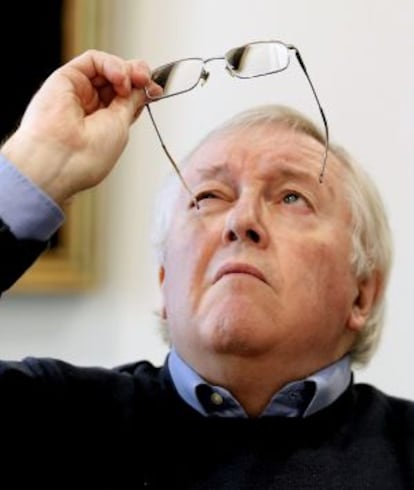Hispanist Paul Preston: “Franco remains a mystery to me”
British historian continues to revise his biography of the dictator, first published in 1993


Since Paul Preston published his landmark study of the life of General Francisco Franco in 1993, he has not stopped revising and expanding the work; for the latest edition, he’s added two new chapters: “One about his relationship with the Jews, and another providing an overview of how he has been treated by other historians and writers.”
In the first case, the British Hispanist enters a gray area, obscured by Franco’s manipulations after the end of World War II. The second means confronting controversy: Franco’s admirers have attempted to rehabilitate his figure and their knives will be sharpened and waiting.
Preston, however, is not worried: “They may sell a lot of books, but they aren’t serious, and attempts to revitalize his figure have proved unsuccessful.”
On top of that, he’s also made amendments all the way through the biography’s more-than 1,000 pages: “Minutiae, details – about his relationship with Hitler, his role in the global conflict, the bombing of Guernica…” The immense flow of a life of maneuvering, word play, icy consideration for those he liquidated, opportunism, and an instinct for survival. “Franco remains a mystery to me,” says Preston from his London home.
Franco was implacable and used all his extermination machinery to eliminate those he considered enemies”
That said, no one has made a bigger contribution to revealing that mystery than the London School of Economics professor. Or at least no one has done it in a more rigorous and sustained way, examining not just Franco’s military career or political maneuvers, but also his psychological profile. Preston uncovers an Oedipus complex, a hatred of his cruel father, his at times lamblike relationship with his wife, Carmen Polo, and the private side of Franco: the man who painted, wrote and loved watching movies.
The Jewish dimension was one of the key aspects of his survival strategy after World War II. “It was a gaping hole in his biography,” says Preston. He had to break his commitment to the Hitler-Mussolini axis and come out looking clean. How did he do it? “By lying, manipulating – as he almost always did,” he says.
“For example, it is not true that he helped save Jews, as his hagiographers claim. His dislike of them never diminished. This myth comes from the time when the Germans informed the friendly countries that if they wanted to take Jews in who passed through their territory, the Germans wouldn’t pursue them to exterminate them.” Franco allowed a fixed number in, but not so that they would stay, but so they could leave Spain without problems and only during a fixed period. “When that time was up, he didn’t move a finger to save them and he didn’t let any more in. He didn’t do much, to tell the truth. There were a few diplomats, such as Ángel Sanz Briz in Hungary, who deserve praise, but they were the exception.”
Life and work
Paul Preston was born in 1946 and educated at Oxford University, where he graduated with a degree in history.
Considered one of the world's leading Hispanists, he first traveled to Spain in the 1960s. He has written biographies of Franco, King Juan Carlos I, veteran communist leader Santiago Carrillo, as well as a monumental work on the Spanish Civil War.
Following the Allied landings in France in mid-1944, when it was absolutely clear that Germany was going to lose the war, he understood that the survivors would play a crucial role in the new world order that would follow Hitler’s defeat. “He did take the whole Jewish-Masonic conspiracy thing seriously, so it wasn’t so difficult, from his perspective, to reach that conclusion. That was when he began to whitewash his image. It’s no surprise that, encouraged by the regime, soon, in 1949, books started to be published such as España y los judíos (Spain and the Jews), which were gestures of rapprochement.”
He set in motion a new strategy to remain in power. “The right word to describe him might be cunning,” says Preston. “He was a man of disguises: during the Civil War he presented himself as El Cid, and in World War II, as Charles V, the Holy Roman Emperor, trying to impose an imperial vision that the Nazis – whom he deeply admired – failed to take seriously. When they fell from power and he faced the prospect of being removed by the victorious Allies, he reinvented himself again as the savior of Spain. And amazingly, it worked.”
Luck or skill? Preston says the vision Franco’s brother-in-law, Rámon Serrano Suñer, tried to present of him as a simpleton does not add up. “I have looked at British diplomatic papers from the time and they recommended not being overly critical of him because this only reinforced his position. [...] He might have seemed a bit mad at times, but I don’t think he was when it came to putting his own interests first.”
Preston describes his job as trying to reveal the man behind the masks. This has meant highlighting Franco’s strengths, as well as his weaknesses. But above all, to remind the world that Franco was a vicious killer. “He was implacable and used all his extermination machinery to eliminate those he considered enemies: communists, liberals, nationalists, republicans…”
He says that the violence Franco unleashed has been played down over the decades. “He invested in terror, he set up his vision of the past, and the need for a dictatorship. How? By controlling the media, but above all by controlling education. He carried out a mass brainwashing that resulted in what we now know today as sociological Francoism. Something that, in many ways, has proved effective to this day.”
From Juan Carlos to Carrillo via the Spanish holocaust
Paul Preston's work focuses on Spain's 20th century. Aside from his writings on Franco and the Spanish Civil War, he has told the story of what he calls the Spanish holocaust: the campaign of mass killings carried out by Franco during and after the conflict. He has also explored Spain's transition from dictatorship to democracy. "Taking everything into account, the transition was the best it could possibly have been," he says.
He has no doubts about the key role played by King Juan Carlos in that process. "He was absolutely fundamental. He used his position as head of the armed forces to control its more reticent members," he says. But everything happened at a time of fear and tension, and when there was less concern about tackling corruption. "It wasn't a priority, not like now. The crisis has highlighted this. Francoism was a regime based on institutionalized corruption, legalized corruption. Franco was very astute at working out the price he would have to pay to his collaborators."
Preston believes history will be kind to Juan Carlos. “His role cannot be played down. What he suffered as a child and in adolescence cannot be changed. His ascent to the throne, his role as a driver of democratic change, his trade diplomacy, and his contribution to the opening up of Spain, of helping it return to the international stage, despite all that might have cast a shadow over his reputation since, will not in any way reduce the importance of what he contributed.”
Tu suscripción se está usando en otro dispositivo
¿Quieres añadir otro usuario a tu suscripción?
Si continúas leyendo en este dispositivo, no se podrá leer en el otro.
FlechaTu suscripción se está usando en otro dispositivo y solo puedes acceder a EL PAÍS desde un dispositivo a la vez.
Si quieres compartir tu cuenta, cambia tu suscripción a la modalidad Premium, así podrás añadir otro usuario. Cada uno accederá con su propia cuenta de email, lo que os permitirá personalizar vuestra experiencia en EL PAÍS.
¿Tienes una suscripción de empresa? Accede aquí para contratar más cuentas.
En el caso de no saber quién está usando tu cuenta, te recomendamos cambiar tu contraseña aquí.
Si decides continuar compartiendo tu cuenta, este mensaje se mostrará en tu dispositivo y en el de la otra persona que está usando tu cuenta de forma indefinida, afectando a tu experiencia de lectura. Puedes consultar aquí los términos y condiciones de la suscripción digital.








































